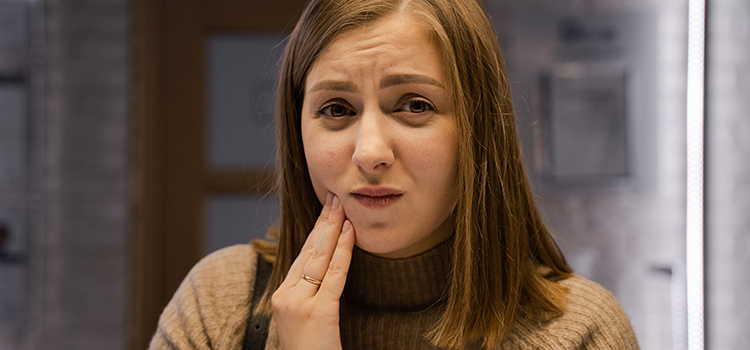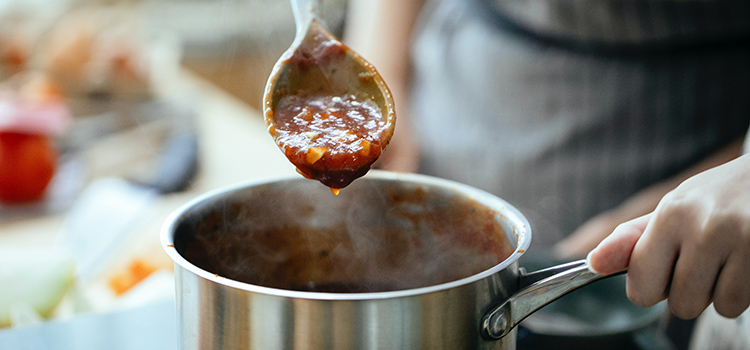Bruxism Diet To Manage Symptoms Of Bruxism
13th Jun 2021

Sleep bruxism and awake bruxism are conditions where you grind your teeth, usually involuntarily and subconsciously. The condition is often caused by stress, sleep disorders, hyperactivity, some medical conditions, and certain medications such as antidepressants. A bruxism diet can help manage this condition and limit your symptoms of bruxism.
Bruxism is estimated to affect anywhere from 3% to 50% of the population, with children more likely to experience the condition (Suni 2020). Researchers struggle to find the exact prevalence of bruxism because many bruxers go undiagnosed. Many painful side effects are associated with bruxism including jaw pain, tooth damage, earaches, headaches, and more.
Food is not often thought to be a cause of bruxism, but what you eat can impact bruxism or a similar disorder called temporomandibular joint disorder (TMD). TMD is the dysfunction of the jaw joint which results in many painful symptoms. In some cases, bruxism may even be caused by a food intolerance or allergy.
In this article, we’ll discuss what foods to avoid and what foods to eat if you have bruxism. We’ll also examine what vitamins and supplements may help bruxism and oral health in general.

Foods to Avoid if you Grind Your Teeth
If you grind or clench your teeth, you probably already know what it feels like to wake up with sore jaw muscles. Chewing foods that further exhaust those muscles can make them even more tired and achy.
It’s in your best interest to avoid foods that promote jaw clenching and that require a lot of chewing. You might also want to avoid foods that damage your teeth as a part of your bruxism diet, because another common symptom of bruxism is weakened teeth.
Some of the top foods to avoid if you have bruxism include:
- Chewing gum
- Chewy candy, such as Tootsie Rolls
- Hard candy
- Crunchy foods, such as pretzels
- Popcorn
- Chewy food, such as tough steak
- Hard food, such as nuts
Bruxers should also avoid anything that includes caffeine or alcohol. These substances can cause increased tension in your jaw and neck muscles, which stimulates jaw muscle hyperactivity and can lead to more grinding and clenching. In addition, both caffeine and alcohol disrupt sleep patterns.
Best Diet for Bruxism
To reduce the strain on your jaw joint and on the surrounding muscles, try eating a diet that consists of mainly soft foods. This might include:
- Applesauce
- Mashed potatoes
- Scrambled eggs
- Yogurt
- Pasta
You could also try adding more anti-inflammatory foods to your bruxism diet. Because inflammation is associated with bruxism and TMJ, these foods might help ease symptoms. Try:
- Fatty fish, such as salmon
- Green leafy vegetables, such as spinach
- Berries, such as strawberries or blueberries

Vitamins and Supplements that Help Bruxism
Although it’s ideal to get all of your vitamins and nutrients through your diet, many of us struggle to do so. There are a few vitamins and supplements you can try that might help with bruxism. Try adding these vitamins and supplements to your daily regimen:
- Magnesium: Magnesium relaxes the nervous system, and it can help relax the twitch muscles in your jaw. This reduces grinding and clenching. Low magnesium levels are also associated with high stress levels, and stress is thought to be one of the most common causes of bruxism (Cuciureanu & Vink 2011).
- Calcium: Calcium deficiency has been linked to teeth grinding and teeth clenching, because it causes bones to weaken and regulates the central nervous system. So, it’s a good idea to make sure your body is getting enough calcium as well (Alkhatatbeh et al 2021).
- Vitamin B and Vitamin C: Vitamins B and C are both associated with better sleep quality and deeper sleep. These vitamins are especially helpful for those suffering from sleep bruxism, as it is classified as a sleep-related movement disorder (Beydoun et al 2014) & (Otocka-Kmiecik & Król 2020).
You may find it difficult to make all these changes at once, so try making one or two adjustments to your diet at a time. This will allow you to consider which foods are really making a difference on your bruxism symptoms.
Related Articles:
Food Allergies and Teeth Grinding
Bruxism has been found to be associated with food intolerance, so in some cases, eating a certain food may cause bruxism if you are allergic. When you eliminate that food from your diet, you might start to see your bruxism symptoms improve.
Common irritating foods that have been associated with bruxism include:
- Salicylates, which are found in plants such as fruits and vegetables
- Preservatives, which are found in most processed foods
- Artificial coloring, which is found in many processed and snack foods
- Gluten, which is found in many wheat products such as bread and pasta
- Dairy, which is found in products like milk and cheese
If you suspect your bruxism may be caused by a food allergy or intolerance, try eliminating one food group at a time. You can also keep a food diary to help you keep track of what types of foods trigger your grinding or clenching.

- Most Popular
- Hard Outside, Soft Inside
- 2MM Thick
- Moderate / Heavy

- Most Durable
- Hard Materials
- 1.5MM Thick
- Heavy / Severe

- For Day Time Use
- Thin, Barely Visible
- 1MM Thick
- Light / Moderate

- For Clenching
- Flexible & Soft
- 1.5MM Thick
- Light / Moderate
Other Treatment Options for Bruxism
The best way to treat bruxism is to find and eliminate the root cause. When that’s not possible; however, other treatment options are available.
Relaxation techniques: These might include exercises to decrease stress on the jaw. These also include whole-body relaxation techniques such as yoga or meditation. A survey by the American Dental Association showed that dentists saw an increase in bruxism starting in 2020 and through 2021. This suggests that the global stress from the COVID-19 pandemic has contributed to an increase in stress-related bruxism (2021).
Muscle relaxants: These are medications that can relax your muscles and reduce muscle activity. They might provide relief from facial pain, jaw pain, or neck pain caused by bruxism. Speak with your healthcare provider or dentist if you feel medication is the right treatment for you.
Mouth guards: These are worn as a protective barrier between your upper and lower teeth, and they can reduce the side effects of bruxism and TMJ. For a proper fit, professional dental labs make night guards using impressions of your teeth. Currently, night guards and splints are one of the most common forms of treatment for bruxism and TMJ.
Botox: When injected into the jaw muscles, Botox can stop the muscle contractions that lead to grinding and clenching. A study published in the Journal of Clinical Sleep Medicine found Botox to be effective for sleep bruxism. The study found a significantly reduced intensity in grinding (Shim et al 2014).
Related Articles:
The Bottom Line
Bruxism can be difficult to manage, particularly because it’s hard to identify the root cause and which symptoms are a result of teeth grinding behavior. Being diagnosed with Bruxism can feel scary. You can take control of your oral health by altering your diet to reduce your symptoms of bruxism.
If altering your diet doesn’t seem to help, or if you’re looking for other options, there are many ways to manage bruxism. Relaxation techniques, muscle relaxants, night guards, and Botox are all viable treatment options as well.
References:
- ADA Writing Staff. (2021). New survey finds stress-related dental conditions continue to increase. American Dental Association. https://www.ada.org/
- Alkhatatbeh, M. J., Hmoud, Z. L., Abdul-Razzak, K. K., & Alem, E. M. (2021). Self-reported sleep bruxism is associated with vitamin D deficiency and low dietary calcium intake: a case-control study. BMC oral health, 21(1), 21.https://doi.org/10.1186/s12903-020-01349-3
- Beydoun, M. A., & et al. (2014). Serum Nutritional Biomarkers and Their Associations with Sleep among US Adults in Recent National Surveys. PLOS ONE. https://journals.plos.org/plosone/article?id=10.1371/journal.pone.0103490
- Cuciureanu, M. D., & Fink, R. (2011). Magnesium and Stress. NCBI. https://www.ncbi.nlm.nih.gov/books/NBK507250/
- Otocka-Kmiecik, A., & Król, A. (2020). The Role of Vitamin C in Two Distinct Physiological States: Physical Activity and Sleep. Nutrients, 12(12), 3908.https://doi.org/10.3390/nu12123908
- Shim, Y. J., & et al. (2014). Effects of Botulinum Toxin on Jaw Motor Events during Sleep in Sleep Bruxism Patients: A Polysomnographic Evaluation. Journal of Clinical Sleep Medicine. https://jcsm.aasm.org/doi/10.5664/jcsm.3532
- Suni, E. (2020). Teeth Grinding. Sleep Foundation. https://www.sleepfoundation.org/bruxism#:~:text=It%20can%20affect%20children%20as,grind%20their%20teeth%20during%20sleep.

- Most Popular
- Hard Outside, Soft Inside
- 2MM Thick
- Moderate / Heavy

- Most Durable
- Hard Materials
- 1.5MM Thick
- Heavy / Severe

- For Day Time Use
- Thin, Barely Visible
- 1MM Thick
- Light / Moderate

- For Clenching
- Flexible & Soft
- 1.5MM Thick
- Light / Moderate

